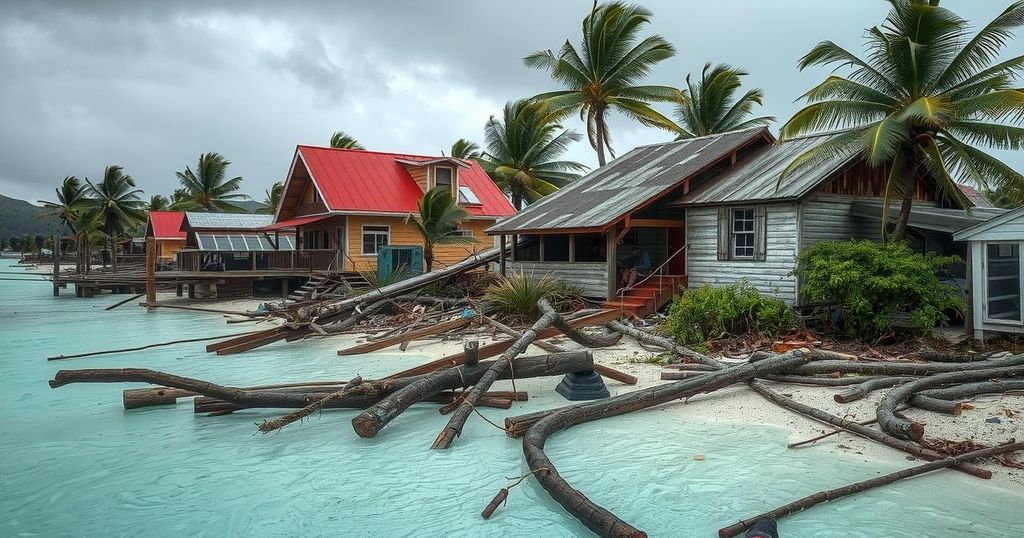World news
AFRICA, BRUNO RETAILLEAU, CAPE TOWN, CHAD YOUYOU, EMERGENCY RESPONSE, EUROPE, EUROPEAN UNION, FRANCE, FRANÇOIS BAYROU, FRANCOIS BAYROU, FRENCH INTERIOR MINISTRY, FRENCH WEATHER SERVICE, INTERIOR MINISTRY, MAYOTTE, NATURAL DISASTER, NATURAL DISASTERS, RESCUE OPERATIONS, SOUTH AFRICA
Ethan Kumar
0 Comments
Cyclone Chido Causes Catastrophic Losses in Mayotte and Mozambique
Cyclone Chido caused at least 11 deaths and extensive damage in Mayotte before making landfall in northern Mozambique. The cyclone has affected 2.5 million people, raising fears of more casualties. The French government is mobilizing resources for recovery efforts, while the regional impact continues to unfold, threatening further devastation and humanitarian crises in affected areas.
Cyclone Chido has tragically resulted in at least 11 fatalities and extensive destruction in Mayotte, a French territory located in the Indian Ocean, prior to its landfall in Mozambique this past Sunday. The cyclone is forecasted to affect around 2.5 million residents in northern Mozambique, with humanitarian agencies cautioning about further loss of life and significant damage in the region. The French Interior Ministry has confirmed the 11 fatalities in Mayotte but noted difficulties in determining the full scale of injuries and destruction, as nine individuals are reported to be in critical condition alongside 246 others injured.
On Friday and Saturday, Cyclone Chido whirled over the southeastern Indian Ocean, also impacting nearby islands including Comoros and Madagascar, where authorities reported that 11 missing fishermen have not yet been located. Mayotte experienced the brunt of the cyclone’s wrath on Saturday, with local officials labeling it the most devastating cyclone in 90 years. In an emergency gathering on Saturday night, French Interior Minister Bruno Retailleau expressed concerns regarding a potentially high death toll and severe devastation of infrastructure—a sentiment echoed by Prime Minister François Bayrou regarding damage to vital facilities, such as the main hospital and airport.
The cyclone sustained winds surpassing 220 kph (136 mph), classifying it as a Category 4 cyclone. Mayotte, with a population exceeding 300,000, is regarded as France’s poorest island and the European Union’s least affluent territory. The cyclone has resulted in entire neighborhoods being destroyed, leaving residents to report uprooted trees and widespread property damage. Local resident Chad Youyou vividly described the aftermath, stating, “Mayotte is destroyed … we are destroyed.”
In response to the crisis, rescue teams and firefighters are being deployed from France and the nearby territory of Réunion, with military aircraft and ships already delivering essential supplies. Plans have been set in motion to facilitate an air and sea bridge from Réunion to Mayotte, with a further 800 rescuers expected to arrive soon and over 80 tons of vital supplies en route. Authorities are prioritizing the restoration of electricity and access to clean drinking water; 1,600 police and gendarmerie officers have been dispatched to assist residents and prevent looting.
As Cyclone Chido progressed into northern Mozambique, UNICEF alerted that the first province to be affected was Cabo Delgado, impacting roughly 2 million individuals. The cyclone has resulted in extensive property damage, leaving communities at risk of isolation from essential services for weeks. Additionally, humanitarian agencies warned of the potential for landslides and flooding in the region, predicting a further escalation in humanitarian crises as the cyclone season continues.
The occurrence of Cyclone Chido highlights the growing frequency and intensity of tropical cyclones, particularly in the southeastern Indian Ocean and southern Africa, correlated to climate change. Cyclones often result in catastrophic consequences for vulnerable populations who bear the brunt of such natural disasters, exacerbating existing social and economic disparities. The cyclones’ impacts, such as flooding and disease outbreaks, pose significant challenges for countries like Mozambique, Malawi, and Zimbabwe, which have faced numerous previous cyclones, like Idai in 2019 and Freddy in recent years, leading to thousands of fatalities. This scenario emphasizes the urgent need for concerted global efforts to address the humanitarian ramifications of climate change, especially for impoverished nations.
In conclusion, Cyclone Chido has inflicted severe damage in Mayotte and northern Mozambique, resulting in numerous casualties and extensive infrastructural losses. The urgent need for humanitarian aid and recovery efforts is paramount as affected regions prepare for the impending challenges of the cyclone season. The international community is called upon to assist these vulnerable populations grappling with the aftermath of such natural disasters exacerbated by climate change, underscoring the importance of coordinated disaster preparedness and response strategies.
Original Source: time.com




Post Comment